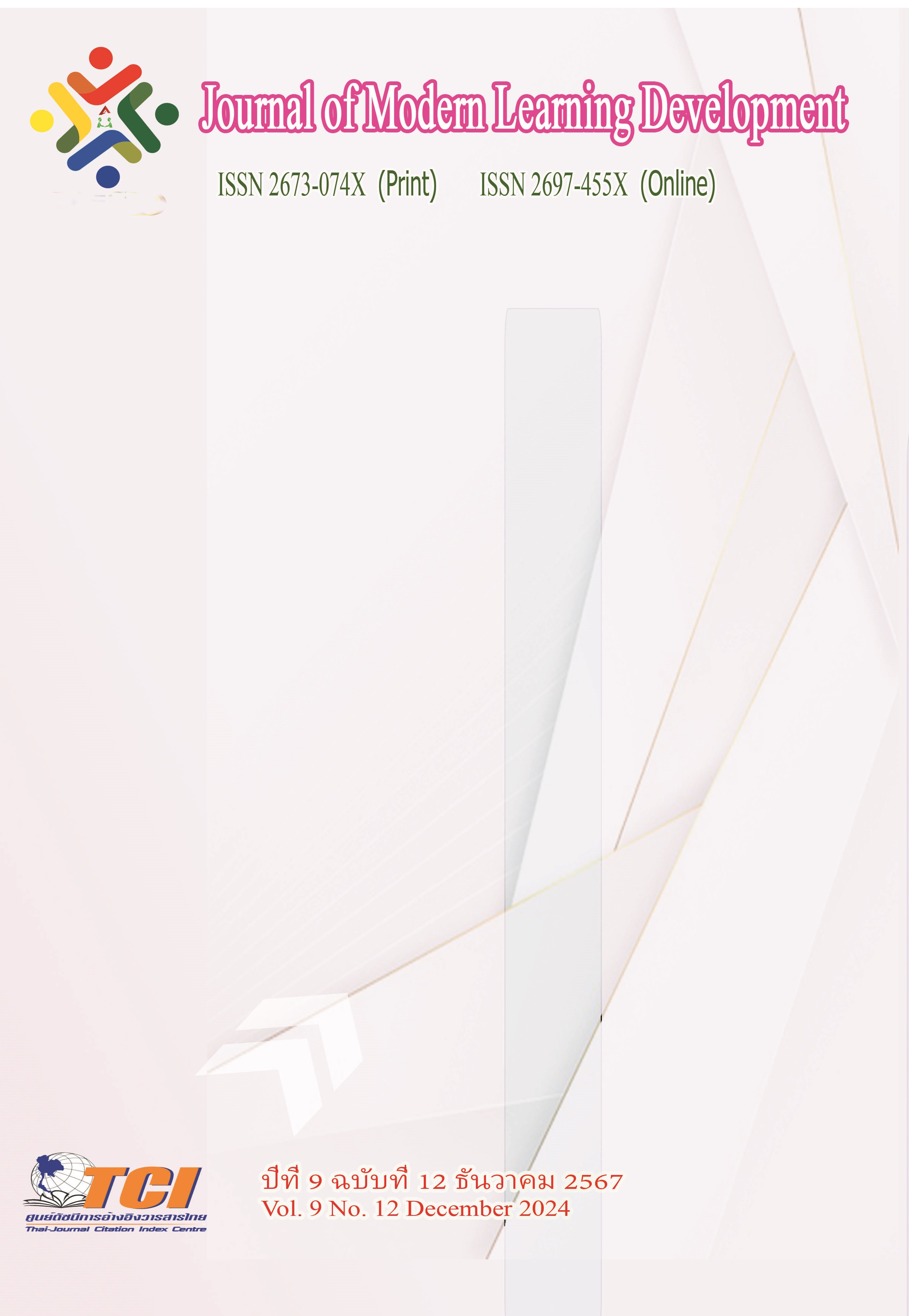การปรับตัวของผู้ประกอบการขนาดเล็กในจังหวัดสงขลาในยุคปัญญาประดิษฐ์
Main Article Content
บทคัดย่อ
ในยุคที่เทคโนโลยีปัญญาประดิษฐ์มีบทบาทสำคัญต่อเศรษฐกิจ ผู้ประกอบการจำเป็นต้องเตรียมพร้อมรับการเปลี่ยนแปลง การวิจัยนี้มุ่งศึกษาการปรับตัวของผู้ประกอบการขนาดเล็กในจังหวัดสงขลาในยุคเทคโนโลยีปัญญาประดิษฐ์ใช้วิธีวิจัยเชิงคุณภาพ โดยสัมภาษณ์เชิงลึกผู้ประกอบการขนาดเล็กที่ดำเนินธุรกิจมาแล้วอย่างน้อย 3 ปี จำนวน 12 ราย จากหลากหลายประเภทธุรกิจ วิเคราะห์ข้อมูลโดยใช้กรอบแนวคิด 7S McKinsey Model ผลการวิจัยพบว่า ผู้ประกอบการส่วนใหญ่นำเทคโนโลยีปัญญาประดิษฐ์มาใช้ในธุรกิจ โดยเฉพาะด้านการวิเคราะห์ข้อมูลและใช้ chatbot ในการตอบโต้กับลูกค้า ธุรกิจที่ก่อตั้งใหม่มีแนวโน้มปรับตัวและใช้เทคโนโลยีปัญญาประดิษฐ์ มากกว่า ผู้ประกอบการส่วนใหญ่มีแผนกลยุทธ์ด้านเทคโนโลยีปัญญาประดิษฐ์แล้ว ส่วนที่เหลืออยู่ระหว่างวางแผน และเริ่มมีการปรับโครงสร้างองค์กรเพื่อรองรับ เทคโนโลยีปัญญาประดิษฐ์แต่ยังอยู่ในระยะเริ่มต้นผู้ประกอบการนำเทคโนโลยีปัญญาประดิษฐ์มาใช้ในการวิเคราะห์ข้อมูล การตลาด และการจัดการสินค้าคงคลัง ทัศนคติของพนักงานต่อเทคโนโลยีปัญญาประดิษฐ์ยังอยู่ในระดับปานกลางเนื่องจาก การขาดความรู้และทักษะ ส่วนผู้ประกอบการยังมีข้อจำกัดด้านงบประมาณ และความไม่แน่ใจเกี่ยวกับผลตอบแทนจากการลงทุน ข้อเสนอแนะสำหรับผู้ประกอบการ ควรพัฒนาแผนกลยุทธ์เทคโนโลยีปัญญาประดิษฐ์ที่สอดคล้องกับเป้าหมายธุรกิจ ลงทุนในการฝึกอบรมพนักงาน และสร้างพันธมิตรกับบริษัทเทคโนโลยีหรือสถาบันการศึกษา สำหรับภาครัฐ ควรพัฒนานโยบายสนับสนุนเทคโนโลยีปัญญาประดิษฐ์ที่เฉพาะเจาะจง และส่งเสริมการพัฒนาหลักสูตรเทคโนโลยีปัญญาประดิษฐ์ร่วมกับสถาบัน การศึกษาและภาคเอกชนการวิจัยนี้ช่วยเติมเต็มช่องว่างความรู้เกี่ยวกับการปรับตัวของธุรกิจขนาดเล็กในยุคเทคโนโลยีปัญญาประดิษฐ์ในบริบทของจังหวัดสงขลา ซึ่งสามารถนำไปใช้ในการกำหนดนโยบายและมาตรการสนับสนุนที่เหมาะสมต่อไป
Article Details
เอกสารอ้างอิง
Acemoglu, D., & Restrepo, P. (2018). Artificial intelligence, automation and work. National Bureau of Economic Research.
AI for SMEs Association. (2024). รายงานสถานการณ์การใช้ AI ในธุรกิจขนาดเล็กและขนาดกลางในประเทศไทย ประจำปี 2024. AI for SMEs Association.
Brynjolfsson, E., & McAfee, A. (2017). The business of artificial intelligence. Harvard Business Review, 7, 3-11.
Bughin, J., Catlin, T., Hirt, M., & Willmott, P. (2018). Why digital strategies fail. McKinsey Quarterly, 1 (1), 61-75.
Davenport, T. H., & Ronanki, R. (2018). Artificial Intelligence for the Real World. Harvard Business Review, 96 (1), 108-116.
Deloitte. (2024). State of Generative AI in the Enterprise. สืบค้นจาก https://www2. deloitte.com/ us/en/insights/topics/artificial-intelligence/state-of-generative-ai-in-the -enterprise.html
Fountaine, T., McCarthy, B., & Saleh, T. (2019). Building the AI-powered organization. Harvard Business Review, 97 (4), 62-73.
Ghobakhloo, M., & Fathi, M. (2020). Corporate survival in Industry 4.0 era: The enabling role of lean-digitized manufacturing. Journal of Manufacturing Technology Management, 31 (1), 1-30. https://doi.org/10.1108/JMTM-11-2018-0417
Johnson, R., Smith, K., & Brown, L. (2022). Challenges in AI adoption for small businesses: A global perspective. International Journal of Small Business Management, 15 (3), 301-315.
Joungtrakul, J., & Ferry, K. N. (2021). Data management in qualitative research. Research Community and Social Development Journal, 15 (2), 1–12.
Lee, J., Suh, T., Roy, D., & Baucus, M. (2019). Emerging technology and business model innovation: The case of artificial intelligence. Journal of Open Innovation: Technology, Market, and Complexity, 5 (3), 44.
OECD. (2021). The Digital Transformation of SMEs. OECD Studies on SMEs and Entre preneurship.
Ransbotham, S., Kiron, D., Gerbert, P., & Reeves, M. (2017). Reshaping business with artificial intelligence: Closing the gap between ambition and action. MIT Sloan Management Review, 59(1). https://webassets.bcg.com/imgsrc/ Reshaping %20 Business%20with%20Artificial%20Intelligence_tcm9-177882.pdf
Russell, S., & Norvig, P. (2020). Artificial Intelligence: A Modern Approach (4th ed.). Pearson.
Siau, K., & Wang, W. (2020). Artificial intelligence (AI) ethics: Ethics of AI and ethical AI. Journal of Database Management, 31 (2), 74-87.
Tuangratanaphan, C. (2024, May 3). Retail AI Technology: No Longer Ignorable. Bangkok Business Article. https://www.bangkokbiznews.com/blogs/business
Waterman, R. H., Peters, T. J., & Phillips, J. R. (1980). Structure is not organization. Business Horizons, 23 (3), 14-26.
World Economic Forum. (2023). Unlocking AI's Potential for Small Businesses: A Global Perspective.
Zhang, Y., Li, J., & Chen, X. (2022). AI adoption in SMEs: A cross-industry analysis. Technological Forecasting and Social Change, 174, 121280.
สมิทธิ์ ลิ้มเจริญ. (2566). การยอมรับเทคโนโลยี AI ในธุรกิจขนาดเล็กและขนาดกลางในประเทศไทย. วารสารบริหารธุรกิจ, 46 (2), 45-62.
สำนักงานพัฒนาธุรกรรมทางอิเล็กทรอนิกส์. (2564). รายงานผลการสำรวจมูลค่าพาณิชย์อิเล็กทรอนิกส์ใน
ประเทศไทย ปี 2564. Resource/publications/Value-of-e-Commerce-Survey-in-Thailand-2019.aspx
สำนักงานส่งเสริมวิสาหกิจขนาดกลางและขนาดย่อม. (2564). รายงานสถานการณ์วิสาหกิจขนาดกลางและขนาดย่อม ปี 2564.สืบค้นจาก https://bds.sme.go.th/Knowledge/Detail/2
วิภาวี สุขสถิตย์. (2566). อุปสรรคและโอกาสในการนำ AI มาใช้ในธุรกิจ SMEs ไทย. วารสารเศรษฐศาสตร์ประยุกต์, 30 (1), 78-95.


